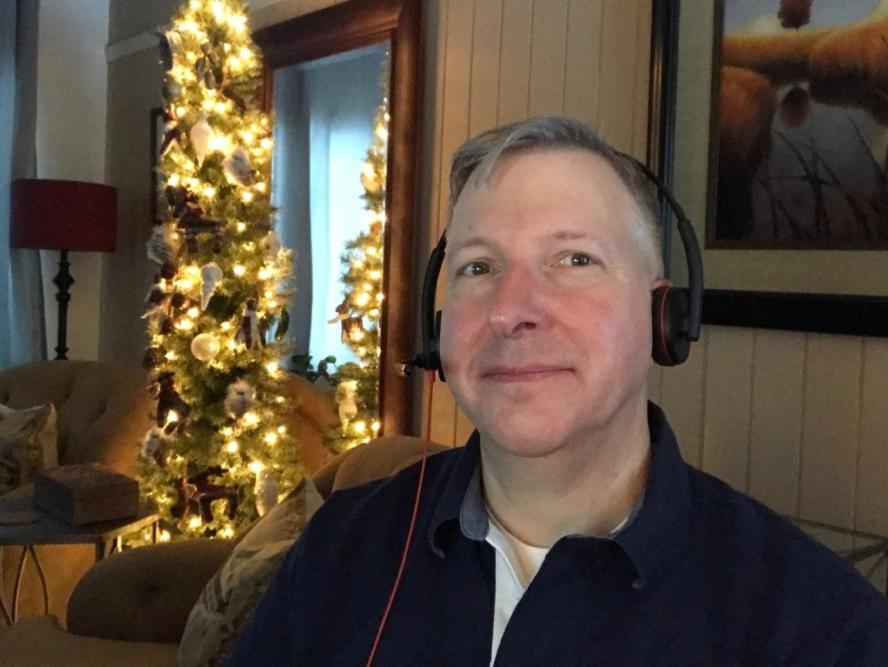-
About
- Leadership & Faculty
- News & Events
-
Academics
- Graduate
- Advanced Clinical Training
- Continuing Education
- Academic Departments
- Academic Offices
- Simulation Experiences
-
Student Life
-
Research
-
Hospitals & Clinics
- Emergency Care
- Hospital Services
-
Community Outreach
- Volunteer
Connecting Through Kindness
From clients to his employees at the Foster Hospital, Paul Hogan focuses on positivity and finding solutions.

Paul Hogan believes that every action should be done with kindness, and that is how the client services supervisor leads his team at the Henry & Lois Foster Hospital for Small Animals.
“I think that if you lead with kindness, you have an opportunity to bridge a lot of gaps in communication,” Hogan says. “It’s very important in this role because we’re dealing with emotions combined with the physical needs of the pets.”
The staff members known as client liaisons play an incredibly important role—connecting pet owners and the doctors at the Foster Hospital, as well as being there emotionally for pet owners. Hogan’s role, in turn, is to help develop and support the liaisons, leading them through all the ins and outs of their interactions on a daily basis. “My main purpose every day is to make sure that my team is supported in a way that they can take care of our clients,” he says.
This year, especially, has been trying. After only four months in his position, Hogan was faced with an unprecedented situation due to the COVID-19 pandemic. However, more than 35 years in retail and customer service equipped him with the personnel management skills—combined with a sense of team spirit—that Hogan needed to face it head on.
Pre-COVID-19, Hogan and his team would work very closely with the clinicians and clients inside the hospital and meet with each other on a regular basis. But the pandemic forced the hospital liaison team to quickly take all their job responsibilities off site, managing everything related to client communications remotely from their respective homes. “And there was no blueprint for that,” Hogan says. “So, soup to nuts, my team and I created the whole process—we collaborated, using everybody’s skills, and we did that successfully and, I want to say, seamlessly.”
When safety restrictions related to COVID-19 were first put in place in the spring, Hogan and his team also were tasked with canceling a large volume of appointments—and ultimately rescheduling those appointments as specialty services reopened at intermittent times. It has been a sometimes frustrating and stressful time for pet owners and the people fielding the calls to help them. Hogan has helped everyone navigate the arduous operation by focusing on finding solutions and being optimistic and kind.
Over the past three months, the hospital has returned to about 95 percent of the appointment volume that it had prior to COVID-19. The call volume in Hogan’s department, on the other hand, has increased significantly over the “old normal,” due to pandemic-related scheduling processes in the hospital, as well as other local veterinary facilities operating at a lower capacity than usual.
“The client liaisons have all worked extremely hard dealing with the changed appointments and helping the hospital carry on,” says Cheryl Blaze, hospital director of the Foster Hospital. “Paul has done an exceptional job at keeping up their spirits and mentoring that team. He is always very professional in all his communications and gracious at all times.”
Despite the workplace and personal challenges tied to life during a pandemic, Hogan and his team have since settled into their roles remotely, tapping into electronic ways to effectively communicate throughout each day.
Though they do not currently see each other or clients at the hospital, Hogan has worked hard to ensure that his team continues to maintain much-needed personal connections. Whether it’s celebrating milestones such as work anniversaries and birthdays or simply calling to see how someone’s day is going, Hogan believes those spontaneous moments and concern for his employees’ wellbeing are important to making them feel like they’re heard and valued.
“I make it a priority to make them a priority,” he explains. “And they truly are—it’s not just a strategy to motivate people, but it’s a belief that things are bigger than me and my bubble.”
Department:
Foster Hospital for Small Animals